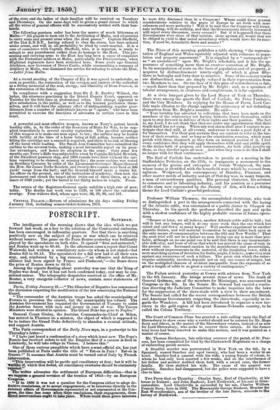POSTSCRIPT.
SATURDAY.
The intelligence of the morning shows that the idea which we put forward last week, as a key to the solution of the Continental embarras, has been encouraged in influential quarters. Not that there is anything positively new on the subject of peace or war Which can be received without reserve. The game on the Paris Bourse yesterday was brilliantly played by the speculators on both sides. It opened "firm and animated,' and Rentes went up to 69.40. In the afternoon came a report that Count Walewski had written a conciliatory note—to whom is not stated—but Rentes fell to 69.15. The speculators for a fall now had it all their own way, and, reinforced by a big rumour,—" an offensive and defensive alliance had been signed by France and Piedmont,"—the Bears drove the price of Relates down to 68.96.
Among the reports floating about yesterday was one that the King of Naples was dead ; but it has not been confirmed today, and may be con- sidered untrue. The telegraphic despatches received at the office of Mr. Renter, a very energetie collector of news, contain some statements of interest.
Turin, Friday January 21.—" The Chamber of Deputies has commenced the discussion respecting the modification of the law concerning the National Guard.
"The commander of the Austrian troops has asked the municipality of Ferrara to provision the citadel, but the municipality has refused. The Austrian Government has requested the Government of Tuscany to assist the Austrian forces with men and money in case of war. The Tuscan Ministers were divided in opinion. The Grand Duke has gone to Naples."
General Count Giulay, the Austrian Commander-in-Chief at Milan, has arrived in Florence on a mission, the object of which is supposed to be to induce the Grand Duke definitively to abandon a neutral attitude, and support Austria.
The Paris correspondent of the Daily Newt says, in a postscript to his Thursday's letter-
" I have just heard a confirmation of a story which is not new. The Pope's Nuncio has received orders to tell the Emperor that if a cannon is fired in Lombardy, he will take refuge in Vienna. I believe this."
One of those curious pamphlets which have a semi-official air' has just been published at Paris under the title of " Est-ce la Pais? Est-ce Is Guerre ?" It assumes that Austria must be turned out of Italy by French intervention.
"This intervention will be pacific and conciliatory at first ; but it will be warlike if, which God forbid, all conciliatory overtures should be obstinately rejected."
The writer advocates the settlement of European difficulties—that is we suppose a general revision of the treaties of 1815—by an European Congress.
"If in 1856 it was not a question for the Congress either to adopt de- finitive resolutions, or to accept engagements, or to intervene directly in the internal affairs of Governments represented or not represented at the Con- gress, the time has come when these resolutions, these engagements, these &'rect interventions ought to take place. 'Where could these grave interests
more fitly discussed than in a Congress? Where could these general considerations relative to the peace of Europe be set forth with more calmness and more authority ? Will it be said that the Congress will termi- nate nothing, will do nothing, and that the Governments directly interested will reject every discussion, every counsel? But if it happened that theso Governments were alone of that opinion, alone against all, would they not be obliged to yield to that moral ascendancy which would have for its sanc- tion, if need be, formidable fleets and armies ? "






























 Previous page
Previous page